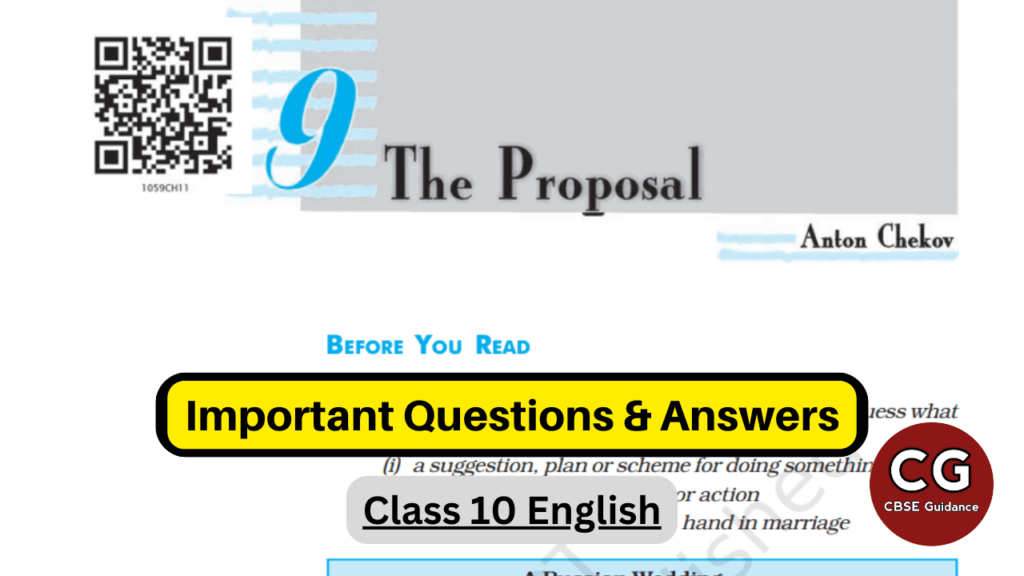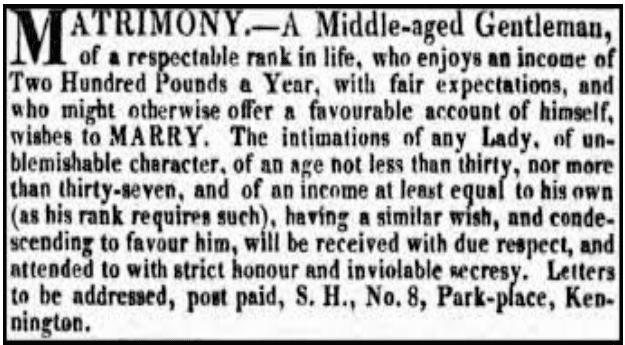Welcome to our comprehensive guide on mastering "The Proposal Class 10" chapter from the English textbook "First Flight". Authored by the renowned playwright Anton Chekhov, this chapter offers a delightful exploration of human relationships and societal norms. As students prepare for their board exams, we understand the importance of providing thorough insights into this chapter. In this blog post, we will demystify the top questions related to "The Proposal," ensuring that students have a clear understanding of the text and are well-prepared for their exams. Additionally, we'll provide important and extra question answers tailored specifically for the upcoming board exams. To further aid your preparation, a downloadable PDF of the key questions and answers will be available for your convenience. Let's delve into the world of "The Proposal" and equip ourselves with the knowledge needed to excel in the class 10 English board exams.

| Subject | English Language & Literature |
| Class | 10 |
| Board | CBSE |
| Chapter Name | The Proposal |
| Type | Important/Extra Questions and Answers |
| Book Name | First Flight Book Chapter 9 |
| Literature | Story |
The Proposal Class 10 Questions Answers
Q. No. 1) Multiple Choice Questions (MCQs) Based on an Extract:
LOMOV: Never mind about my people! The Lomovs have all been honourable people, and not one has ever been tried for embezzlement, like your grandfather!
CHUBUKOV: You Lomovs have had lunacy in your family, all of you!
NATALYA: All, all, all!
CHUBUKOV: Your grandfather was a drunkard, and your younger aunt, Nastasya Mihailovna, ran away with an architect, and so on...
LOMOV: And your mother was hump-backed. [Clutches at his heart] Something pulling in my side... My head... Help! Water! CHUBUKOV: Your father was a guzzling gambler!
i. Choose the option that correctly identifies the tone of the characters in the given extract.
- antagonism
- humour
- contempt
- irony
a) (1) and (2)
b) (2) and (4)
c) (1) and (3)
d) (3) and (4)
Ans. Option (c)
ii. The playwright’s intention in the given extract is to
a) throw light upon the weaknesses of the rich in any society.
b) emphasize that family history is important in a marriage proposal.
c) satirize the superficiality of the upper class in Russian society.
d) send a message that ego is not healthy in any relationship.
Ans. Option (c)
iii. If according to Chubukov and Natalya, Lomovs are not “honourable people”, why do they still consider Lomov’s proposal?
a) Natalya can take care of her father if she marries close by.
b) They were exaggerating in the argument and didn’t mean it.
c) They understand that honour is superficial and overrated.
d) Lomov’s status in society supersedes everything.
Ans. Option (d)
iv. Imagine you found the playwright’s notes for each scene in the play and noticed that some of the words were missing.
Choose the option that fills the missing words most appropriately.
A conversation that starts pleasantly quickly turns into a (i) ________ argument. With (ii) _________ of Oxen Meadows at the heart of the matter, Lomov and Natalya quarrel and are later joined by Chubukov. Thus, begins a (iii) ____ of insults, accusations and name-calling. All (iv) _______ disappears. Eventually, Lomov leaves clutching at his heart, his foot numb.
a) (i) petty ; (ii) history ; (iii) series; (iv) politeness
b) (i) vicious ; (ii) ownership ; (iii) circus ; (iv) civility
c) (i) curious ; (ii) land ; (iii) outpouring ; (iv) laughter
d) (i) ugly ; (ii) neighbourhood ; (iii) barrage; (iv) goodness
Ans. Option (b)
v. Which of the following options comes closest to the meaning of ‘tried’ as used in the extract?
a) She mastered the game through a process of trial and error.
b) He followed the trial closely and was seen in court every day.
c) This had been a tried and tested formula for the organization.
d) They tried with all their might to repeat their earlier successes.
Ans. Option (b)
Q. No. 2) Multiple Choice Questions based on an extract.
CHUBUKOV: What a weight off my shoulders, ouf!
NATALYA: But, still you will admit now that Guess is worse than Squeezer.
LOMOV: Better!
NATALYA: Worse!
CHUBUKOV: Well, that’s a way to start your family bliss! Have some champagne!
LOMOV: He’s better!
NATALYA: Worse! Worse! Worse!
CHUBUKOV: [trying to shout her down] Champagne! Champagne!
i. Which of the following titles of Shakespeare’s plays might best apply to the relationship of Lomov and Natalya’s relationship?
a) The Taming of the Shrew
b) Romeo and Juliet
c) As You Like It
d) Two Gentlemen of Verona
Ans. Option (c)
ii. How would you characterize Chubukov’s mood based on the given extract?
a) cautious and celebratory
b) relieved and jubilant
c) merry, yet thoughtful
d) grateful, yet hurt
Ans. Option (b)
iii. Based on the extract, Lomov, and Natalya’s closing lines can best be seen as
a) a humorous and ironic take on typical marriage vows.
b) a reflection of their affection for Guess and Squeezer.
c) a sign of the prospective instability in their marital bliss.
d) the writer’s statement that disagreement is part of marriage.
Ans. Option (a)
iv. Choose the option that correctly uses the idioms to fill in the blanks of the paragraph below.
In a team, it is important to (i) __________. Otherwise, you would become (ii) _______, and incur the displeasure of the others. When that happens, you might feel (iii) ___________. However, for the others, not having to carry you along would be a (iv) ___________.
a) (i) pull your weight; (ii) dead weight; (iii) the weight of the world on your shoulders; (iv) weight off the shoulders.
b) (i) weight yourself; (ii) the weight of the world on your shoulder; (iii) like dead weight; (iv) weight off their shoulders
c) (i) throw weight around; (ii) worth your weight in gold; (iii) weight off your shoulders; (iv) dead weight
d) (i) lend weight to someone; (ii) heavy weight; (iii) like pulling your weight; (iv) weight off their shoulders
Ans. Option (a)
v. The liberal use of exclamatory marks in the given extract indicates that the characters are expressing
a) apologies in a solemn and heartfelt tone.
b) good counsel and advice in a serious matter.
c) reconciliation on matters leading to argument.
d) strong feelings with a raised voice.
Ans. Option (d)
Must See: The Proposal Class 10 Important MCQs
Q. No. 3) To what end does the playwright employ Lomov’s palpitations in the play?
Ans. The playwright employs Lomov's palpitations to create humor and highlight his anxiety, adding comic effect to his attempts to propose marriage.
Q. No. 4) Which two issues about himself convinced Lomov of his decision to get married?
Ans.
- His age: he is 35 years old, a "critical age," and needs to settle down to lead a regular life.
- He describes his health issues: palpitations, nervousness, and poor sleep, emphasizing that marriage seems necessary for stability rather than love.
Q. No. 5) What was Lomov's opinion about Squeezer?
Ans. Lomov considered Squeezer to be an inferior dog compared to his own dog, Guess. He believed Squeezer was "overshot," meaning that its lower jaw was shorter than the upper, which made it a bad hunter. Lomov also felt Squeezer was not worth much and argued that many dogs like Squeezer could be found easily. In his opinion, Squeezer was not as good as Guess in terms of quality and hunting ability.
Q. No. 6) LOMOV: It's cold... I'm trembling all over, just as if I’d got an examination before me. The great thing is, I must have my mind made up. If I give myself time to think, to hesitate, to talk a lot, to look for an ideal, or for real love, then I'll never get married. Brr...It’s cold! Natalya Stepanovna is an excellent housekeeper, not bad-looking, well-educated. What more do I want? But I'm getting a noise in my ears from excitement. (Drinks) And it’s impossible for me not to marry. In the first place, I'm already 35— a critical age, so to speak. In the second place, I ought to lead a quiet and regular life. I suffer from palpitations, I'm excitable and always getting awfully upset; at this very moment my lips are trembling, and there’s a twitch in my right eyebrow.
(The Proposal)
i. Which of the following is NOT a reason why Lomov thinks he must marry?
a. He is already 35 years old.
b. He suffers from palpitations.
c. He is excitable and easily upset.
d. He is in love with Natalya.
ii. Why is it fair to say that Lomov's tone, when he says "What more do I want?", is uncertain and questioning? Answer in about 40 words.
iii. Read the following descriptions (a)-(c) and identify which one correctly corresponds to the extract.
- (a) A debate is a formal discussion on a particular topic, usually with two or more people presenting different viewpoints and arguments.
- (b) A soliloquy is a speech given by a character alone on stage, which reveals their innermost thoughts and feelings to the audience.
- (c) An aside is a brief comment or remark made by a character directly to the audience, which is not intended to be heard by other characters on stage.
iv. If an actor were to enact this extract, what would he be required to focus on, while modulating his voice?
Ans. i. Option (d)
ii. Lomov's tone when he says "What more do I want?" is uncertain and questioning because he is trying to convince himself that Natalya Stepanovna is a suitable match for him, but at the same time, he seems to be struggling with doubts and fears. His tone suggests that he is trying to reassure himself that he has made the right decision, but he is not entirely convinced.
iii. (b) A soliloquy is a speech given by a character alone on stage, which reveals their innermost thoughts and feelings to the audience. [cannot be (a) as it is not a formal discussion and cannot be (c) because what he speaks is certainly not brief]
iv. The actor would be required to convey Lomov's nervousness and excitement through his voice modulation. [For example, he could raise his voice when Lomov is getting excited or lower it when he is feeling anxious.]
Q. No. 7) “The Lomovs and the Chubukovs have always had the most friendly, and I might almost say the most affectionate, regard for each other.”
How would you evaluate Lomov and Chubukov’s relationship as neighbors?
Ans. Lomov and Chubukov might say they're best friends, but the play shows they actually:
- Argue a lot, even over silly things.
- Try to outdo each other, like bragging about their dogs.
- Are polite on the surface, but it doesn't seem genuine.
So, forget the "affectionate regard," their relationship is more like a bumpy road.
Q. No. 8) When Natalya comes to meet Lomov, she quotes her father’s words – “and papa said, “Go; there’s a merchant come for his goods.”
What do you think Chubukov meant?
Ans. Chubukov's comment reflects his view of marriage as a business transaction. By calling Lomov a "merchant" and Natalya "goods," he reduces her to property being acquired. This reveals his materialistic priorities and lack of respect for Natalya's individuality and agency in choosing a partner.
Q. No. 9) How can we say that Natalya was continuously successful in maintaining an upper hand during her arguments with Lomov?
Ans. Natalya maintained an upper hand in her arguments with Lomov through her assertiveness and refusal to back down. For instance:
- On the meadows: She confidently declared the meadows belonged to her family and supported her argument with strong conviction.
- On the dogs: She praised Squeezer’s pedigree and hunting qualities while pointing out Guess’s flaws, such as being old and unattractive.
Her persistence and determination allowed her to dominate the conversations.
Q. No. 10) The argument about the dogs reflected that both Lomov and Natalya loved their respective dogs very much.
Do you agree? Why/ why not?
Ans. I agree partially. Their argument does showcase passion for their dogs, but it's more about pride and one-upmanship than pure love. They focus on pedigree, accomplishments, and perceived superiority, making it less about genuine affection and more about using their dogs as extensions of themselves.
Q. No. 11) Why do you think Natalya Stepanova asked her father to call Lomov back when she heard that he had come up with a proposal?
Ans. Natalya likely asked her father to call Lomov back because she realized she had feelings for him and didn't want to miss the opportunity for a marriage proposal.
Q. No. 12) Provide a brief insight into what Lomov and Natalya’s married life might look like.
Ans. Their married life likely wouldn't be blissful. Their constant bickering, even before marriage, suggests a future filled with petty arguments over dominance and status. Their inability to see past their own egos and find common ground could lead to constant clashes, making their home a tense battlefield.
Q. No. 13) Do you think Chubukov is a good father? Justify your opinion based on your reading of the text.
Ans. Chubukov is a caring father who wants Natalya to get married. He supports her in arguments and worries about her future. However, he is short-tempered and creates drama, which shows he cares more about social status than peace.
Q. No. 14) Read the statements given below:
- Statement 1 - ‘Lomov is looking to marry.’
- Statement 2 – ‘Lomov is looking to marry Natalya.’
Bring out the difference between the two statements and explain what it tells you about Lomov.
Ans. The difference between the two statements lies in specificity. Statement 1 implies Lomov's general desire to marry, while Statement 2 specifies Natalya as the potential spouse. This suggests that Lomov is more focused on the idea of marriage itself in the first statement, while in the second, he has a specific person in mind, indicating a more targeted romantic interest.
Q. No. 15) Analyze the character of Natalya. How does she contribute to the conflicts in the play?
Ans. Natalya is argumentative, stubborn, and proud. She refuses to accept Lomov’s claims about the Oxen Meadows and his dog. Her competitive nature fuels the conflicts, making the situation humorous.
Q. No. 16) The Proposal is often called a satire on human nature and relationships. Explain with examples from the play.
Ans. The play highlights how people prioritize trivial issues over important matters. Instead of focusing on the marriage proposal, Lomov, Natalya, and Chubukov argue over Oxen Meadows and their dogs. This shows their stubbornness, greed, and lack of communication.
Q. No. 17) The play focuses on trivial matters rather than the serious issue of marriage. What lesson can we learn from this?
Ans. The play teaches us to prioritize important matters and not let trivial issues ruin relationships. Communication and understanding are key to avoiding unnecessary conflicts.
Q. No. 18) Compare and contrast the characters of Chubukov and Lomov in the play. How do they deal with the conflicts?
Ans. Chubukov is loud and impatient but tries to resolve the arguments. Lomov, on the other hand, is nervous and gets overly emotional during conflicts. Both are equally stubborn and contribute to the humor in the play.
Q. No. 19) Compare and contrast what Anne from the poem 'Anne Gregory' would look for in a life partner as compared to Natalya from 'The Proposal'. Justify your answer with one example from each of the texts.
Ans. Anne Gregory from the poem "Anne Gregory" by W.B. Yeats seeks a partner who values her inner qualities, as shown by her desire for someone who loves her for herself alone, not just for her external appearance like her "yellow hair." She prioritizes genuine affection and connection over superficial attributes. In contrast, Natalya from "The Proposal" by Anton Chekhov appears more concerned with societal status and material gains in a life partner, as evidenced by her father's pressure for her to marry for property consolidation. Unlike Anne, Natalya's criteria for a partner seem influenced by external factors rather than intrinsic qualities.
Q. No. 20) Though the play revolves around three people, Russian society emerges as an important character through the ongoings of the play and the thoughts and interactions of its characters.
Imagine yourself to be a historian who has been invited to speak about nineteenth century upper class Russian society.
Based on your reading of the play, how might you describe it? Support your evaluation with instances from the text.
Ans. Nineteenth-century upper-class Russian society, as depicted in "The Proposal" by Anton Chekhov, appears to be deeply entrenched in traditional values and social conventions. The play portrays a society where marriage is often treated as a transaction for consolidating wealth and property, as seen in Chubukov's insistence on Natalya marrying Lomov for land acquisition. Moreover, the characters' exaggerated displays of politeness and etiquette reflect the importance placed on maintaining appearances and social status. This is evident when Lomov and Natalya engage in a heated argument over trivial matters, yet attempt to maintain decorum in front of Chubukov. Overall, the play presents a satirical commentary on the superficiality and rigid social norms prevalent in nineteenth-century Russian upper-class society.
Q. No. 21) Farce is a kind of comedy that includes situations and dialogues that are ridiculous, exaggerated, and even absurd. Evaluate the play, The Proposal, as a farce.
Ans. The Proposal can be evaluated as a farce due to its farcical characters, ridiculous behavior, and exaggerated situations. The play is filled with humor, improbable scenarios, and childish behavior, with characters making a big deal out of minor issues. Arguments and quarrels escalate quickly, and insults are hurled without a second thought. Differences are resolved only to lead to fights over new topics. Lomov's exaggerated nerve problems and Chubukov's theatrical statements add to the absurdity. Natalya's impulsive and belligerent remarks further contribute to the farcical nature of the play. The chaotic manner in which the final proposal is made amidst all the chaos solidifies its classification as a farce.
Q. No. 22) Natalya and Ivan argued about the ownership of Oxen Meadows and the superiority of their respective dogs in the play, The Proposal. Imagine yourself as the playwright of the play. Based on your understanding of the personality traits of Natalya and Ivan, write a dialogue based on an imaginary event, showcasing another argument between them.
Ans.
Natalya: Ivan, I can't believe you're still arguing about Oxen Meadows! It's been settled ages ago that it belongs to my family.
Ivan: Natalya, you know very well that the land rightfully belongs to the Chubukovs. Your father might have convinced himself otherwise, but the truth is undeniable!
Natalya: How dare you question my father's judgment? The Chubukovs have owned Oxen Meadows for generations, and no amount of your stubbornness will change that!
Ivan: Stubbornness? Look who's talking! You and your family are too proud to admit when you're wrong. And let's not even start on your so-called superior dog!
Natalya: My dog is far better than yours, Ivan! Yours couldn't catch a rat if it tried!
Ivan: Oh please, Natalya! Your dog wouldn't know what to do with a real challenge! It's all bark and no bite, just like its owner!
Natalya: How dare you insult me and my dog! Get out of here before I throw you out myself!
Ivan: Fine! I'll leave, but mark my words, Natalya, the truth about Oxen Meadows will come out eventually, and you'll regret ever doubting me!
Natalya: Get out, and don't you dare come back until you've learned some respect!
Q. No. 23) Look at the given matrimonial advertisement published in the Morning Post (newspaper) in December 1822. It was fairly common practice in the nineteenth century for gentlemen and ladies to seek courtship and matrimony by placing a suitable advertisement.

a) Based on your reading of the play and an understanding of the characters, what details would Lomov provide (and specifically leave out) in a matrimonial advertisement to find a bride like Natalya?
b) Think of what might make Chubukov shortlist Lomov’s advertisement if he were scanning the matrimonial section of the newspaper.
Ans. a) Lomov's matrimonial advertisement might read:
Matrimony - A well-to-do gentleman, possessing a substantial estate with valuable livestock and fertile land, seeks a suitable match for marriage. The lady must come from a respected family background and exhibit impeccable manners and decorum. Age between twenty-five and thirty, with a modest dowry and a keen interest in managing household affairs. Correspondence to be directed to L.L., Esq., at his estate in the countryside.
Lomov would likely emphasize his wealth and property holdings while downplaying any personal shortcomings or health issues. He might also omit any mention of his nervous disposition or tendency towards hypochondria to present himself in the best possible light.
b) Chubukov might consider Lomov's advertisement due to his perceived wealth and status. As a landowner himself, Chubukov would value Lomov's substantial estate and the potential for land consolidation through marriage. He would likely see Lomov as a suitable match for his daughter, Natalya, given their shared social standing and financial means. Chubukov would be particularly interested in Lomov's landholdings and income, viewing them as advantageous for securing his daughter's future.
Hope you liked these Important (extra) Questions & Answers on Class 10 English First Flight Book Chapter 9 'The Proposal'. Please share this with your friends and do comment if you have any doubts/suggestions to share.



Sir Thanks So much. Sir Fog Ka Bhi upload Kijiye Aur Other Jo English Ka Bacha Hai Jaldi Sir Please.